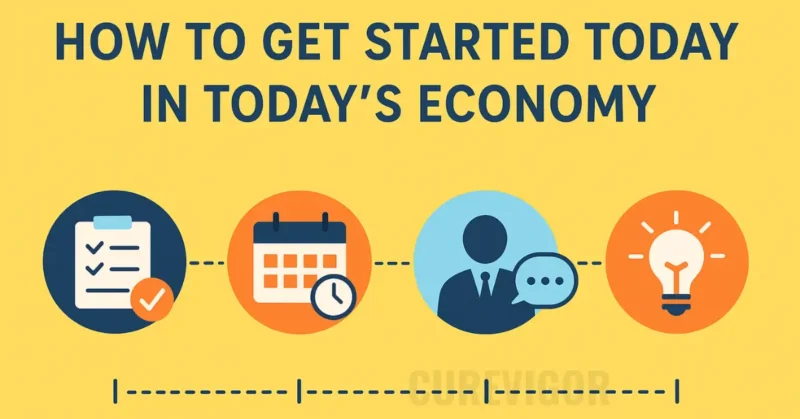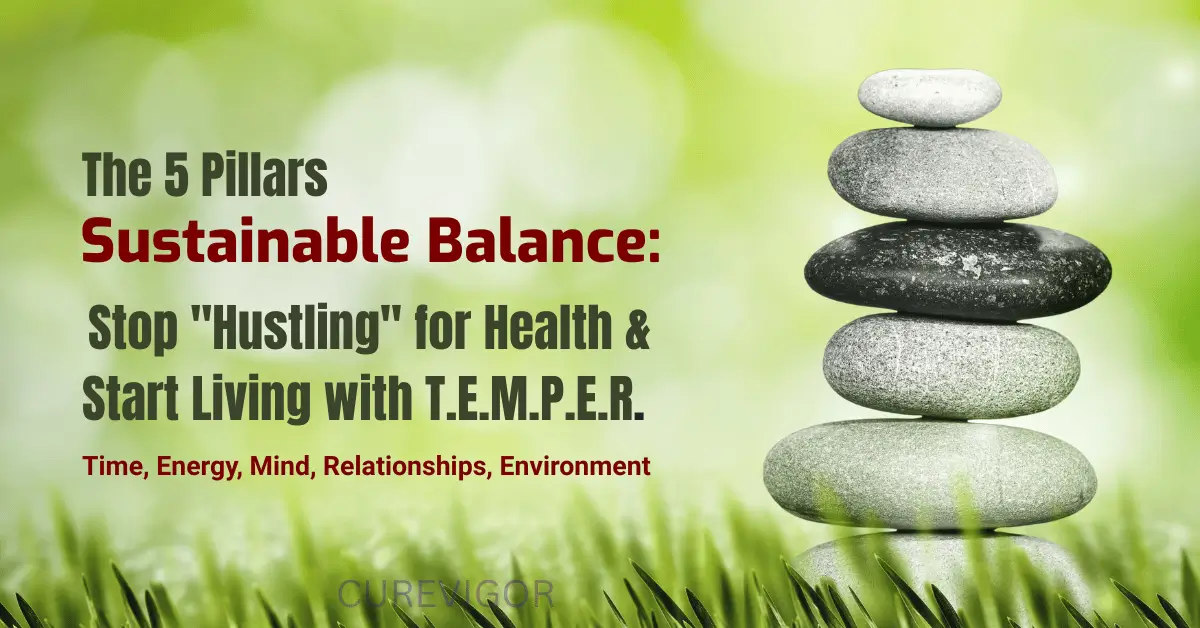Explore how work–life balance drives innovation, retention, and well-being in today’s economy. Get simple, science-backed tips to start today.
Thank you for reading this post, don't forget to subscribe!Why Work–Life Balance Is More Critical Than Ever in Today’s Economy
In today’s economy, where technology never sleeps and market shifts happen at lightning speed, maintaining a strong work–life balance is no longer a nice-to-have—it’s a strategic necessity. For example, research from Gallup shows that employees working 45 + hours per week and feeling disengaged are at significantly higher risk of burnout.
In today’s economy, where uncertainty and speed define nearly every industry, the ability to pause, rest, and recalibrate has become a genuine superpoAs uncertainty and speed define nearly every industry in today’s economy, being able to pause, rest, and reconfigure has become a real superpower.

It’s no longer just about surviving the workweek — it’s about creating a rhythm of life that supports both success and sanity. The truth is, your career can only grow as strong as your well-being allows.
According to the World Health Organization, long working hours now account for nearly 750,000 premature deaths every year — a figure that’s steadily climbing as digital tools extend our workdays. Yet, companies that encourage balance report stronger innovation, higher retention, and better overall performance.
In short, balance isn’t a retreat from ambition; it’s a redefinition of it. When we protect our boundaries, we give our best energy to what matters most — both at work and at home.
That’s what this article is about: a powerful, positive shift you can make right now to thrive in today’s economy.
You’ll learn why balance is your competitive edge, how to spot the hidden drivers of burnout, and how to design a practical framework that lets you work smarter, live fully, and succeed sustainably.
In this article, you’ll discover why, in today’s economy:
- Balanced living fuels productivity & creativity
- Healthy work–life practices support retention, morale, and long-term success
You can start taking real steps now to shift your life and career toward sustainable balance.
Let’s explore.
The Business Case for Work–Life Balance in Today’s Economy
In a world where every second of attention and creativity drives growth, the business case for work–life balance has never been clearer—or more compelling. Companies once obsessed with “productivity at any cost” are now realizing that balance is the true engine of long-term success.
Productivity Gains vs. Overwork Pitfalls
In today’s economy, where competition is global and deadlines are relentless, the most productive employees aren’t those chained to their desks—they’re the ones who know when to stop. Rested minds make smarter decisions, and focused energy delivers better outcomes.
A growing body of research supports this. Teams that take regular breaks and maintain flexible schedules complete projects faster and with fewer errors. It’s a reminder that human energy, not time, is the real currency of performance.

Overworking might feel noble, but it silently sabotages creativity, concentration, and problem-solving. The result? More mistakes, slower innovation, and higher stress levels—none of which help a business thrive in today’s economy.
True productivity isn’t about doing more; it’s about doing better. By empowering employees to rest and recharge, leaders can unlock the kind of focus and originality that automation can’t replace.
Retention, Engagement, and the Talent War
Talent is the new currency, and in today’s economy, retaining it is everything. Employees no longer just seek a paycheck—they’re searching for purpose, flexibility, and quality of life. Companies that offer these values become magnets for top performers.
A balanced workforce is an engaged workforce. When people feel trusted to manage their time and well-being, loyalty follows naturally. They bring their best selves to work, stay longer, and contribute with passion instead of obligation.
On the flip side, burnout leads to absenteeism, disengagement, and costly turnover.
Forward-thinking companies like Microsoft, Salesforce, and Patagonia are proving that work–life balance isn’t just good ethics—it’s good economics. Their cultures of trust and flexibility directly correlate with innovation, retention, and profit.
Health, Well-Being, and Economic Resilience
A thriving economy depends on thriving people. Chronic stress, burnout, and exhaustion don’t just impact individuals—they ripple across entire industries through lost productivity, medical costs, and declining morale.
In today’s economy, where adaptability is everything, mental and physical well-being become strategic assets. Employees who sleep well, eat healthily, and have time for family and hobbies show stronger cognitive performance and higher emotional intelligence.
They’re better at solving complex problems, collaborating, and adapting to change—skills that are priceless in a rapidly shifting marketplace.
When organizations invest in work–life balance through wellness programs, flexible schedules, and mental health support—they’re not offering perks; they’re building resilience. A healthy workforce is the foundation of a stable, innovative, and future-ready economy.
Ultimately, balance pays dividends—for employees, for businesses, and for society at large. In today’s economy, the smartest investment any organization can make is in its people’s well-being.
Top 5 Drivers of Imbalance in Today’s Economy
Understanding what’s driving the imbalance helps you fight it. Let’s look at five major drivers in today’s economy.
Remote-Work “Always-On” Culture
In today’s economy, the rise of remote and hybrid work means that many workers are constantly reachable, blurring the line between “on-the-clock” and “off-the-clock”.
According to Gallup, fully remote workers report higher engagement—but also higher stress and lower overall life-thriving. Gallup.com
This “always-on” expectation wears people down.
Digital Distractions & Notifications
Technology empowers us—but also overloads us. The pressure to respond to emails, messages, and tasks outside normal hours is part of today’s economy and creates perpetual background stress (sometimes called digital presenteeism).
Managing digital flow is essential for balance.
Gig-Economy & Job Pressure
Flexible work, side-hustles, and gig-economy roles are increasingly common in today’s economy. While offering freedom, they often lack structure, boundaries and predictable rest—leading to lifestyle creep and imbalance.
Blurred Home/Work Boundaries
When your kitchen table becomes your office, it becomes harder to switch off. In today’s economy, where remote/hybrid models dominate, the physical separation between work and life has eroded—making balance more challenging.
Perfectionism & Hustle Mentality
Finally, in today’s economy, the narrative that success requires “grind, hustle, 24/7” is pervasive. That mindset drives people to forego rest, boundaries, and self-care—often at great cost.
The 5-Pillar Fixes for a Balanced Work & Life
Here’s your practical framework for thriving in today’s economy. These five pillars support sustainable work–life balance.
Time – Define & Defend Your Hours
• Set and stick to “office hours”.
• Use tools like calendars, time-blocking and alerts to build structure.
• Decline meeting invites outside your defined time when possible.
In today’s economy, reclaiming your time is a powerful act.
Energy – Prioritise Recharge & Recovery
Time alone isn’t enough; you need energy. Schedule short breaks, movement, rest, and micro-recovery rituals. Research shows employees who recharge return with higher focus and creativity.
In today’s economy, your human energy is your competitive edge.
Mind – Guard Your Mental Well-Being
This pillar covers mindfulness, mental clarity, and emotional health.
• Practice 5-minute mindfulness or breathing exercises.
• Create mental boundaries: shut off notifications, have a “switch-off” routine.
In today’s economy, mental resilience is just as valuable as skills.
Relationships – Prioritise People Outside Work
Work-life balance means more than just you and your job—it means your family, friends, and passions.
• Set regular “family check-in” times.
• Cultivate hobbies, social connections, and offline rituals.
In today’s economy, personal relationships fuel your long-term fulfilment.
Environment – Optimise Your Physical & Digital Space
You need a workspace that supports balance:
• Have a designated workspace (especially for remote work) and “leave” it at the end of the day.
• Create digital detox zones (e.g., no laptop after 7 pm).
In today’s economy, the environment you choose plays a big role in sustaining your balance.
How to Get Started Today in Today’s Economy

Big transformations don’t begin with grand gestures—they start with small, deliberate shifts in your daily rhythm.
In today’s economy, where it’s easy to feel stretched thin, these subtle changes can have an enormous ripple effect on your energy, focus, and overall happiness.
Think of it as reprogramming your lifestyle for balance—one mindful decision at a time.
Mini Self-Audit Quiz — Discover Your Balance Baseline
Before you can fix an imbalance, you need to see it clearly. This self-audit isn’t about guilt; it’s about awareness.
Ask yourself honestly:
- How often do I find myself thinking about work when I’m supposed to be relaxing?
- When was the last time I spent a full day without checking work messages?
- Do I end my workday with a sense of completion or with anxiety about unfinished tasks?
- How often do I feel mentally exhausted—even on weekends?
- What would “balance” really look like for me in today’s economy?
Write your answers down. The goal is to create a snapshot of your current reality—so you can measure real progress later.
Quick-Wins Checklist — Small Habits, Big Shifts
Start simple. You don’t need to reinvent your schedule—just reclaim it.
- Pick a real stop time. When you log off, log off for good. Even 30 extra minutes of true rest counts.
- Silence the noise. Try muting notifications after 7 p.m.—you’ll be amazed how peaceful evenings feel.
- Move your body. Take a 15-minute walk, stretch, or dance between calls. Motion resets emotion.
- Reclaim your mornings. Resist diving into email the moment you wake up. Start with a slow ritual—coffee, journaling, a walk, or quiet time.
- Reconnect. Plan one small social activity this week—a family dinner, phone call, or catch-up with a friend. Connection restores perspective.
These micro-moments of discipline create a powerful compounding effect. In today’s economy, where the line between life and work fades fast, each boundary you set becomes a silent act of empowerment.
Download the Free 7-Day Balance Checklist — Your Launchpad to Change
You don’t need to wait for the weekend, a promotion, or the “perfect time.” Start today.
Grab the Free 7-Day Balance Checklist, a practical tool designed to help you apply the five pillars—Time, Energy, Mind, Relationships, and Environment—to your own life.
Every day focuses on one pillar, guiding you through tiny, achievable habits that add up to meaningful change. By the end of the week, you’ll notice more clarity, energy, and calm—proof that even in today’s economy, balance isn’t just possible; it’s powerful.
Before vs. After: What Balanced Looks Like in Today’s Economy
Let’s compare typical “Before” and “After” scenarios to illustrate the change.
| Aspect | Before: Imbalanced in today’s economy | After: Balanced approach in today’s economy |
| Work Hours | Frequent late nights, weekend catch-up | Fixed finish time, no work after hours |
| Notifications | Emails/pings 24/7 | Work device off after the specified time |
| Recharge | Few breaks, skipping rest | Short breaks, scheduled downtime |
| Relationships | Work dominates personal life | Regular non-work activity and social time |
| Boundaries | Blurred home/work overlap | Designated workspace, clear “off” time |
| Health & Energy | Low energy, high fatigue | Steady energy, improved well-being |
This table illustrates how in today’s economy you’re not just surviving—you’re thriving.
FAQs on Work-Life Balance in Today’s Economy
Q1. What is work–life balance, and why is it important in today’s economy?
Work–life balance is the art of managing professional responsibilities and personal well-being in harmony. In today’s economy, where work can easily spill into every corner of our lives, maintaining this balance is essential for long-term success and happiness.
It helps you stay focused, creative, and emotionally grounded, while preventing chronic stress and burnout. A balanced lifestyle promotes better decision-making, healthier relationships, and more consistent performance.
Ultimately, it’s not about working less—it’s about living smarter and prioritizing what truly matters most.
Q. How can a poor work–life balance affect my health and career in today’s economy?
Poor balance can silently erode both physical and mental health. Overworking leads to chronic fatigue, poor sleep, anxiety, and even cardiovascular issues—conditions that reduce productivity and motivation.
In today’s economy, where adaptability and creativity are key, exhaustion makes it difficult to perform at your best. You may also notice strained relationships and decreased engagement at work.
Over time, this imbalance doesn’t just hurt your health—it limits your growth, reduces your effectiveness, and can lead to professional burnout or early career stagnation.
Q. Can maintaining work–life balance actually boost productivity in today’s economy?
Absolutely! Numerous studies show that balanced employees are far more productive, creative, and focused than those constantly overworked. In today’s economy, where attention spans are short and distractions are everywhere, taking time to recharge gives you a sharper edge.
Rested minds think clearly and solve problems faster, leading to higher-quality work in less time. Companies that encourage balance also see lower turnover and absenteeism, proving that working smarter—not longer—is the new productivity model for sustainable success.
Q. How can I set healthy boundaries when working remotely in today’s economy?
Start by defining clear working hours and communicating them to your team. Treat your workspace like an office—when the day ends, shut down your laptop and walk away. In today’s economy, remote work can easily blur personal boundaries, so discipline is key.
Turn off work notifications during off-hours, and create rituals that signal “work is done,” like an evening walk or playing music. Setting these boundaries allows your mind to rest and refocus, ensuring that you bring your best energy to work the next day.
Q. Why are Millennials and Gen Z more focused on work–life balance in today’s economy?
Younger generations have witnessed the toll of burnout and overwork on their parents and older colleagues. They understand that success without health or happiness isn’t true success.
In today’s economy, where flexibility and purpose are valued more than titles, Millennials and Gen Z seek jobs that align with their personal values and lifestyle. They prioritize freedom, mental wellness, and fulfillment alongside career growth.
This shift is reshaping workplace culture and forcing employers to create healthier, more flexible environments.
Q. What can companies do to promote work–life balance effectively in today’s economy?
Companies need to move beyond slogans and take actionable steps to support their teams. Offering flexible schedules, mental health resources, and remote-work options are key starting points.
In today’s economy, businesses that protect employee well-being experience higher engagement and retention. Encouraging vacations, limiting after-hours communication, and celebrating rest as much as results can transform culture.
When people feel supported as whole human beings—not just workers—they perform better, stay longer, and bring authentic enthusiasm to their roles.
Q. How can I start improving my own work–life balance right now?
Begin with small, realistic changes—set a daily stop time, take mindful breaks, and protect at least one “no-work” day each week. In today’s economy, change doesn’t require drastic steps—it’s about steady, intentional progress. Revisit your goals and align your habits with what truly fulfills you.
Unplug from screens after hours, nurture relationships, and give your body rest. Every mindful action creates momentum, turning small adjustments into lasting transformation. The key is consistency—tiny habits practiced daily become life-changing balance over time.
Q. How can employers measure the impact of work–life balance in today’s economy?
Measuring the success of work–life balance initiatives goes beyond tracking hours—it’s about assessing engagement, satisfaction, and performance. Employers in today’s economy can start by monitoring key indicators like employee retention rates, absenteeism, and productivity trends.
Regular surveys and one-on-one check-ins reveal how supported and valued employees truly feel. Companies can also review participation in wellness programs and feedback from exit interviews to spot cultural strengths and weaknesses.
Over time, a balanced workforce shows measurable improvements: fewer sick days, higher morale, and stronger innovation. The data speaks clearly—when employees thrive, businesses prosper too.
Conclusion: A Powerful Positive Shift You Can Make Right Now
In today’s economy, it’s easy to feel like you’re always one step behind—constantly chasing deadlines, notifications, and expectations. But here’s the truth most people overlook: balance isn’t something you find; it’s something you build.
It’s a choice you make—one mindful moment at a time—to protect what truly fuels you.
When you pause long enough to rest, breathe, and reflect, you’re not falling behind—you’re gathering strength. You’re reclaiming control from the chaos of busyness and permitting yourself to live intentionally.
That’s not a weakness. That’s leadership because the best leaders, creators, and innovators in today’s economy know that sustained success depends on sustainable living.
This is your invitation to create that shift—not tomorrow, not when things calm down, but today.
Start with one small act of balance:
- Shut your laptop five minutes early.
- Go for a walk without your phone.
- Eat lunch away from your desk.
- Say “no” to one unnecessary meeting this week.
These small moments are where transformation begins. Over time, they add up to a calmer mind, sharper focus, and a richer life—the kind that can withstand the volatility of today’s world.
In the end, work–life balance isn’t about doing less—it’s about living more. It’s about designing a rhythm that supports your goals without sacrificing your joy. It’s about being present for your work, your people, and yourself in equal measure.
So, take that first step today. Reclaim your time, restore your energy, and protect your peace. Because in today’s economy, your most powerful asset isn’t how much you produce—it’s how well you live.That’s the powerful positive shift you can make right now.
Read more articles on Health and Balance.
You might like to read:


